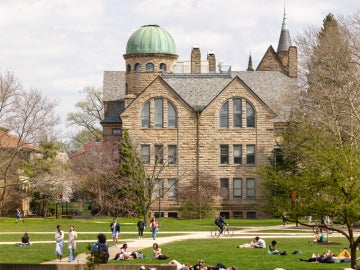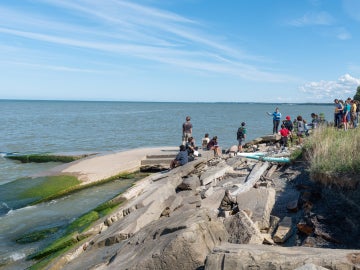A STRONG Beginning
May 31, 2016
Amanda Nagy

Incoming first-years in the STRONG program attend a skills session in summer 2015.
Photo credit: Tanya Rosen-Jones
Rising second-year Ifunanya Ezimora knew she wanted to study psychology when she applied to Oberlin, but she had only a vague notion of academic research, likening it to the mainstream model of hard science—test tubes and beakers, lab coats and microscopes.
As a participant in Oberlin’s inaugural program for underrepresented students called Science and Technology Research Opportunities for a New Generation (STRONG), Ezimora soon learned that research is far more broad in scope.
“Being in STRONG has made research more accessible to me and changed my views. Now I know it looks like many different things, and I plan to do research throughout my four years at Oberlin,” says Ezimora, who has already declared a psychology major and intends to add a second major in environmental studies.
The STRONG program represents Oberlin’s commitment to meeting the needs of students from a variety of backgrounds and experiences and helping them succeed in STEM fields and research. Through a summer residency program, a cohort of 11 students entering their first year get a head start on settling in and making connections with the people on campus who will be there to support them throughout their years at Oberlin. The aim is to offer early exposure to campus and the city of Oberlin, and to build relationships with the faculty, students, and staff who can help reinforce their academic and personal success.
The program targets admitted students who identify as either first-generation college students, Pell Grant-eligible, women, or people of color.
STRONG scholars are paired with professors who serve as research mentors. During the four-week summer residency, each scholar works full time in a research group with current Oberlin students who are conducting projects under the guidance of the faculty mentor. Scholars have the opportunity to continue in the same research group for their first winter-term project.
The program benefits include a $2,000 stipend for full-time work in a professor’s research group through the month of July; fully funded housing and dining for the summer, as well as a $400 benefit to cover round-trip travel to and from Oberlin for the summer residency; and a book award to offset the cost of course textbooks in the first year.
Curriculum during the 2015 residency included workshops on study skills and time management, math skills for scientists, communicating effectively with professors, and sessions on Excel.
Scholars also share a single, dedicated academic advisor who will work with them until they declare their majors, and they receive special ongoing support in STEM classes during their first year through a partnership with the Center for Learning, Education, and Research in the Sciences (CLEAR).
With their first year behind them, STRONG scholars and faculty mentors agree that the program has been transformative. For students, the emotional support, academic advising, and early lab skills made transitioning from high school to college much less daunting. And since faculty-student collaboration is the hallmark of an Oberlin education, for professors, the time invested in first-years means they will have better researchers when they’re juniors and seniors.
Finding community
Angel Nuñez joined Associate Professor of Physics Jason Stalnaker’s lab last summer. He worked on an experiment aimed at exploring the atomic structure of potassium atoms.
“My projects involve quite a bit of quantum mechanics and atomic theory, subjects that are not covered until students are in their third and fourth years,” Stalnaker says. “However, the projects are also very hands-on, so students can be involved and contribute to the experiments even if their understanding of the theory motivating the work is not fully developed.”
Nuñez returned to Stalnaker’s lab in the spring, when he worked on a lithium atomic spectroscopy project. “Having Professor Stalnaker as a mentor has been incredible, as he is always kind, supportive, and understanding. I knew even before applying to STRONG that I wanted to study science, but the program solidified that interest. My original plan was to study only chemistry, but the research I did over the summer made me want to study physics as well,” says Nuñez, who is from Newberg, Oregon. He declared majors in both during the second week of his first semester.
The physics community suffers from a lack of diversity, and STRONG has the potential to help address that problem, Stalnaker says. “I think STRONG can show underrepresented groups that they belong in STEM fields and that they can succeed.”
Marcus Hill became immersed in upper level geometry by working with Assistant Professor of Geology Amanda Schmidt. The hands-on experience and early exposure to quantitative skills paid off in a big way—for his first winter term, he accompanied Schmidt on a research trip to China. In the spring, he rejoined her lab, where he has been reading, interpreting, and organizing Schmidt’s data on soil erosion rates in southern China into meaningful graphs and plots.
His academic success aside, Hill stresses the benefits of being a part of a community. “I can’t even imagine what my first year would have been like without STRONG,” says Hill, who is from Novi, Michigan. “My closest friends are those I met last July, and because we all stayed in Third World [Program House], I met two other great friends who are upperclassmen.”
He also appreciates the academic advising he received at the beginning of each semester from program director Afia Ofori-Mensa, director of the Office of Undergraduate Research.
“Afia met with us in the beginning of each semester to ensure we had our schedules all planned out, as well as helping us with time management for homework, big assignments, and free time, too.”
Ofori-Mensa is also director of undergraduate research and a visiting assistant professor of comparative American studies. She says a measure of success is seeing the scholars enjoying themselves and practicing what they’ve learned.
“Last summer’s STRONG scholars were, like all the best Oberlin students, really talented at expressing their gratitude. They did so genuinely and frequently throughout the program, to various people they encountered along the way. That was really a standout feature of the summer for me.”
They became known for riding their bikes, which they rented from the Bike Co-op, all around campus together. “I judged the success of this first run by how much they laughed together, in addition to what they seem to have learned. When I told them that we would get together after the Add/Drop period ends to put together semester plans for the fall term, with all their class times and study sessions laid out, one scholar said, ‘Oh, I was just on my way back to my dorm to do that,’ and another said, ‘I already did.’ When I see a student putting into practice something new that they learned, that is always a highlight for me.”
Ezimora worked with Professor of Psychology Cindy Frantz on the Environmental Dashboard, in which she developed content for the community voices component and designed an experiment to test its effects. This summer, she is working as a community engaged research fellow for the Oberlin Project and the Environmental Dashboard.
“The most fruitful collaborations I’ve had with students are ones that started early in their career,” says Frantz, whose research focuses on humans’ relationship with the natural world. “Ify hit the ground running her first semester. This not only furthers my research program, but it gives Ify huge advantages. She is way ahead of her peers in terms of experience and opportunity. She has already presented at a conference, something that typically students can’t do until their senior year.”
Ezimora, a sprinter on the track and field team from Sacramento, California, echoes the sentiment about finding a community in STRONG. She values the connections she made with faculty, as well as the skills sessions that were offered in the summer.
“I’m definitely more comfortable academically and socially because of STRONG. It put me in a better head space for the first year and made be a better student. Prospective students should not only consider this opportunity, they should actively pursue it.”
You may also like…
Oberlin Launches Critical AI Studies Minor in Fall 2026
With a solid foundation in both science and the humanities, this minor ensures students to understand and be able to analyze the ethical, cultural, environmental, political, economic, technological, and labor effects of AI.
Research Roundup
Every day, Oberlin’s faculty and students produce scholarly work that uncovers new insights into how we understand the world, particularly in the areas of sustainability and the environment.
Three Things with Jillian Scudder
Oberlin’s astrophysicist-author shines a light on our dark universe.


